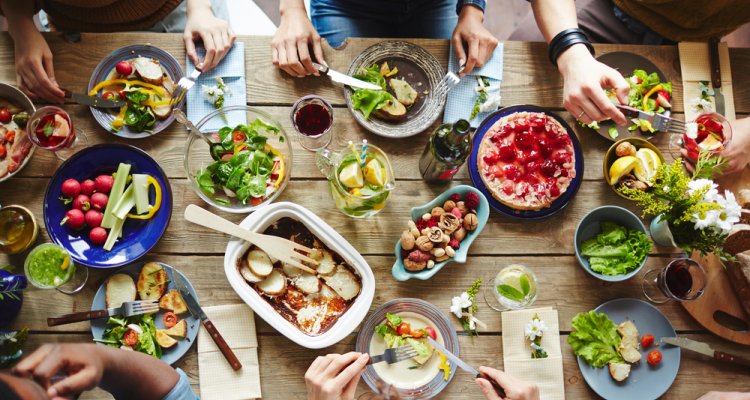Wageningen University & Research hosts symposium ‘The environmental impact of food systems’
Lots of animal feed is suitable for human consumption. However, our food system is not set up to make use of these remains. ‘The food system is broken’, Hannah van Zanten, researcher at Wageningen University & Research (WUR) states at the start of the symposium ‘The environmental impact of food systems’, which was recently hosted at WUR.
During the symposium, almost 600 researchers, students, entrepreneurs and representatives of NGOs joined forces to consider a new food system setup. This ambition requires significant changes, such as a reduction in meat consumption, waste prevention, better global food distribution and food system circularity.
At the end of the symposium, panel members from the business sector and NGOs, speakers and a large number of other attendees joined a consortium that seeks to guide the transition to a sustainable food system in coming years. To this end, they are submitting a subsidy application to the European Union.
The opening presentation by Van Zanten, associate professor at the Farming Systems Ecology chair group, offered insight into what a fully circular European food system could look like and what benefits it would yield for land use, CO2 emissions and the number of people in Europe and the rest of the world with a healthy diet, among others. ‘This may sound like a radical change, but a system of this kind is achievable. After all, we can use more sustainable energy, eat more plant-based food and cultivate more diverse crops – meaning less animal feed and more legumes-, prevent waste and make improvements in our use of organic fertiliser, but this does require a new attitude and behavioural changes from both producers and consumers.’
Time for the consumer and the system to change
Other speakers explained what is necessary to realise the transition to a different food system. For example, Anita Frehner (Research Institute of Organic Agriculture FiBL) highlighted the individual contributions of consumers who choose to eat less meat, switch to an organic diet or eat locally produced food. Friederike Ziegler (RISE Research Institutes of Sweden AB) addressed the role of seafood in a sustainable food system, and Michael Clark (University of Oxford) presented the route to an eco-label on products that consumers buy in supermarkets.
The presentations by Tara Garnett (University of Oxford) and Benjamin Bodirsky (Potsdam Institute for Climate Impact Research (PIK)) tackled the bigger picture of a system change. Bodirsky covered various growth scenarios that move away from the current economic model of constant growth. He paid special attention to a Degrowth scenario. A society striving for this focusses on universally improving the wellbeing of all people while reducing the importance ascribed to economic growth to bring this about.
Finally, Garnett covered the complexity of the real world. Here, factors like human biology, personal and cultural beliefs, the availability and affordability of food and legislation also play a role.
Shared concerns
The presentations raised questions and critical responses alike, as well as personal views and experiences. However, there were also shared concerns about the recalcitrant reality in which this change will have to take place. ‘We know what we need, but how do we get the political domain to play their part in guiding these changes from the top?’ was one of the points that were raised.
The symposium was concluded with a conversation between panel members, and the audience was asked about the next steps in this transition. Sarah van Buren (Young Climate Movement), Berry Marttin (Rabobank), Quirrine de Weerd (Lidl), Jaap Korteweg (Vegetarische Slager) and Ruud Zanders (Kipsters) joined the conversation. The panel members all agreed that waiting for the perfect next step is not the way forward. Instead, we need to experiment. ‘Show what’s possible’, ‘Invest in innovation and measure its progress’, and ‘Don’t wait, but act.’
Everyone has a part to play
The panel discussed the role of young people in stimulating changes and initiating experiments. Van Buren stated that young people in organisations aren’t given enough space to put innovative ideas into practice. The rest of the panel joined in with the emphatic invitation to keep coming up with refreshing ideas. ‘Be the change you want to see.’
In addition to experimentation and innovation, changes in our perspective on animals and nutrition would help. ‘It is time to acknowledge the feelings of animals, so we can strive for fewer animals in our food system’, Zanders says. ‘We need education to highlight the value of proper nutrition’, De Weerd adds. Members of the audience also raised the issue of the limited attention to sustainability in vocational education. There is still a lot of room for improvement in this area to boost support for change from society.
The number of signatures for the new consortium is growing rapidly, and companies, researchers and other participants continued to sign up even after the symposium. Van Zanten: ‘It’s great to see so many people are interested in lending their thoughts on what a radically different European food system could look like.’ By now, the consortium includes over 90 parties.

